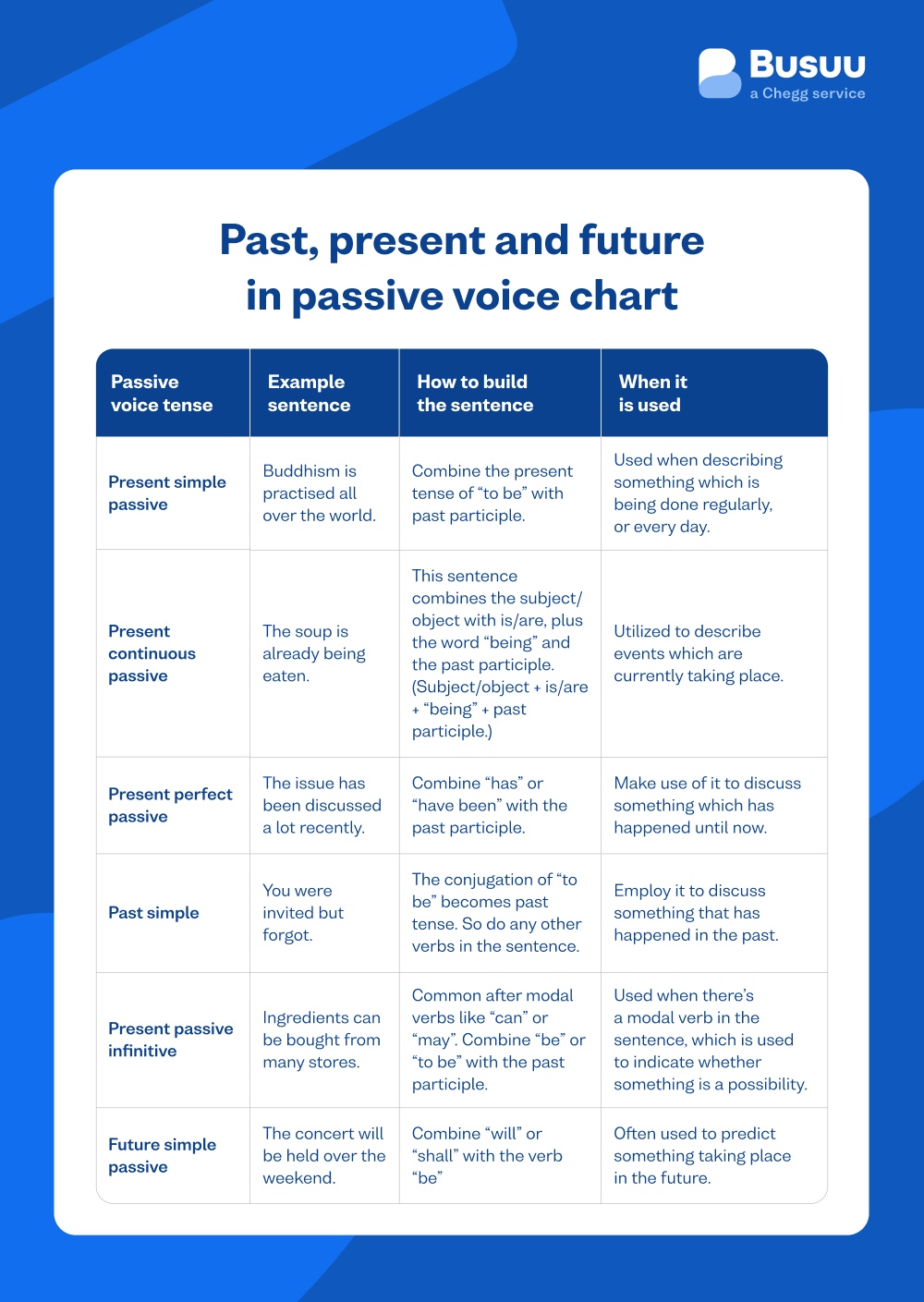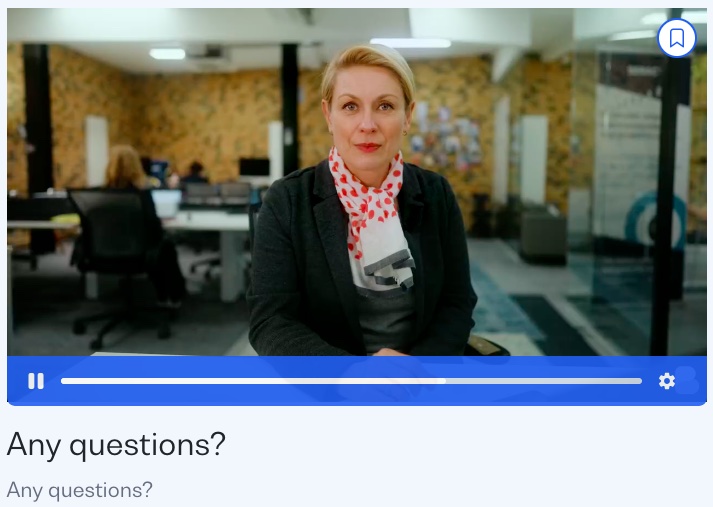How to Use English Passive Voice?
Make your writing more assertive by learning when it’s best to use – or not use the passive voice.
I want to learn...
Passive voice is useful when you want to focus more on who is receiving an action, rather than who is completing it. Passive voice sentences don’t necessarily tell you who has completed an action. Instead, the focus is on who is receiving the action. However, that doesn’t mean that you don’t have to include who has completed the action in a passive voice sentence. What’s important to remember is that the emphasis is on the recipient, rather than the actor.
In some contexts, such as academic writing, you’ll often find that passive voice is being used. Read on to find out when to use passive voice and how to best incorporate it into your writing.
What is passive voice
If you’re asking yourself: “What is passive voice in writing?” Then you’re probably not sure when you’re using it.
To start, let’s think of the verb “to be”. When a sentence is in the passive voice, you’ll be able to spot a conjugation of this verb. The example below shows the use of a passive voice sentence where there’s this conjugation:
“Mediterraneans are known around the world for their balanced diet.”
Additionally, you might notice that the word “known” here is – interestingly – a past participle. If you want to describe something that’s still happening – or will continue to happen in the passive voice, you’ll combine the present tense of the verb “to be” that’s used, with an adjective that is a past participle.
So going back to our case of “Mediterraneans are known around the world for their balanced diet”, “Mediterraneans” are still known for their balanced diet, and so we use the past participle.
Past participles
Past participles might be confusing at first, but just remember that in this case, the past participle in a passive voice sentence creates a perfect tense. This means that the sentence is referring to something that’s still happening. Below is another example where the sentence is still true in the present, but uses a past participle in order to make it passive voice:
The film Citizen Kane is seen as one of the greatest movies of all time.
“Seen” is the past participle here, and “is” - the conjugation of the verb “to be”.
This is known as the present simple passive. You’ll usually find it in sentences where something is continuously being done over a long period of time.
However, this is just one example of when you might find passive voice in a sentence. You’ll find the tense of the verb “to be” will change if you want to talk about the past, present, or the future. They also almost always use the past participle we mentioned above. To get a grasp of how to talk about the past, present, or future in passive voice, try to memorize the table below:

Past, present and future in passive voice chart
| Passive voice tense | Example sentence | How to build the sentence | When it is used |
|---|---|---|---|
| Present simple passive | Buddhism is practised all over the world. | Combine the present tense of “to be” with past participle. | Used when describing something which is being done regularly, or every day. |
| Present continuous passive | The soup is already being eaten. | This sentence combines the subject/object with is/are, plus the word “being” and the past participle. (Subject/object + is/are + “being” + past participle.) | Utilized to describe events which are currently taking place. |
| Present perfect passive | The issue has been discussed a lot recently. | Combine “has” or “have been” with the past participle. | Make use of it to discuss something which has happened until now. |
| Past simple | You were invited but forgot. | The conjugation of “to be” becomes past tense. So do any other verbs in the sentence. | Employ it to discuss something that has happened in the past. |
| Present passive infinitive | Ingredients can be bought from many stores. | Common after modal verbs like “can” or “may”. Combine “be” or “to be” with the past participle. | Used when there’s a modal verb in the sentence, which is used to indicate whether something is a possibility. |
| Future simple passive | The concert will be held over the weekend. | Combine “will” or “shall” with the verb “be”. | Often used to predict something taking place in the future. |
Active vs passive voice
The active voice involves placing emphasis on who is completing the action and how. Conversely, the passive voice takes the emphasis completely away from who is completing the action.
If you want to mention who is completing the action, you might include them instead in what’s known as a prepositional phrase. A prepositional phrase is a modifier. This means that it tells you how the verb or noun is in a sentence. This takes emphasis away from who is completing the action and places it on the modified verb or noun instead.
When to use passive voice (and when to avoid it)
Stick to writing in the passive voice if you’re describing an event but you don’t know who completed the action. If someone sent you the wrong letter in the post, but you don’t know who the sender was, you could say:
- “I have been sent the wrong letter in the post today.”
You can also use passive voice when you’re discussing common beliefs or norms in a culture.
Consider the first example in our guide:
- “Mediterraneans are known around the world for their balanced diet.”
Another key example is in a scientific paper:
- “The patients were placed under observation.”
You can safely assume that if this comes up in a scientific paper, then the scientists were responsible for this.
While passive voice is more common in the above examples, it’s often best to avoid using it in most sentences that you construct. Writing in the passive voice can make your writing sound less direct. If your reader doesn’t know who has completed the action in the first place, it can make your writing sound a bit vague. Writing in an active voice is also much more exciting for readers. Which sentence do you think is more impactful?
- “Julie cooked us an amazing dinner.”
Or:
- “An amazing dinner was cooked for us.”
If you went with the first sentence, then you’ve chosen the active sentence rather than the passive voice. The first sentence tells us more about who cooked the dinner, and gives us some information about the person (that they’re an amazing cook). Active voice provides a far richer context for readers, and so in most cases it’s a good idea to use it instead of passive.
Conclusion
To sum it up: passive voice is when the sentence focuses mainly on the recipient of the action, rather than the person doing the action. This means that passive voice is indirect, and thus not that impactful.
When you’re describing someone doing something, it’s usually more effective to write in an active voice. Stick to using passive voice when you don’t know who completed the action, or you’re writing an academic paper.
Improving vocabulary as well as grammar?
Busuu's free downloadable dictionaries are the best way to improve your vocabulary and English skills, no matter what your goals. Start leveling up your English vocabulary today and learn together with a community of native English speakers!

